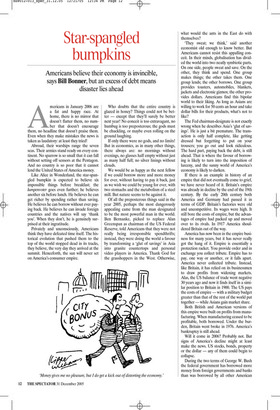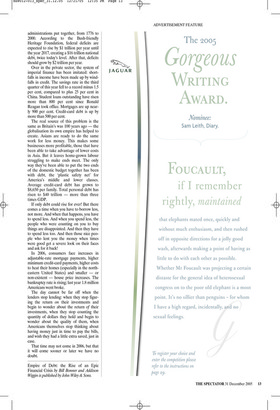Star-spangled bumpkins
Americans believe their economy is invincible, says Bill Bonner, but an excess of debt means disaster lies ahead Americans in January 2006 are a fat and happy race. At home, there is no mirror that doesn’t flatter them, no number that doesn’t encourage them, no headline that doesn’t praise them. Even when they make mistakes the news is taken as laudatory: at least they tried!
Abroad, their warships range the seven seas. Their armies stand ready on every continent. No sparrow is so small that it can fall without setting off sensors at the Pentagon. And no country is so poor that it cannot lend the United States of America money.
Like Alice in Wonderland, the star-spangled bumpkin is expected to believe six impossible things before breakfast; the lumpenvoter goes even further; he believes another six before lunch. He believes he can get richer by spending rather than saving. He believes he can borrow without ever paying back. He believes he can invade foreign countries and the natives will say ‘thank you’. When they don’t, he is genuinely surprised at their ingratitude.
Privately and unconsciously, Americans think they have defeated time itself. The historical evolution that pushed them to the top of the world stopped dead in its tracks, they believe, the very day they arrived at the summit. Henceforth, the sun will never set on America’s consumer empire. Who doubts that the entire country is glazed in honey? Things could not be better — except that they’ll surely be better next year! No conceit is too extravagant, no humbug is too preposterous; the gods must be chuckling, or maybe even rolling on the ground laughing.
If only there were no gods, and no limits! But in economics, as in many other things, there always are: no mornings without evenings, no glasses half empty without just as many half full; no silver linings without clouds.
We would be as happy as the next fellow if we could borrow more and more money for ever, without having to pay it back, just as we wish we could be young for ever, with two stomachs and the metabolism of a steel mill. But nature seems to be against it.
Of all the preposterous things said in the year 2005, perhaps the most dangerously appealing came from the man designated to be the most powerful man in the world. Ben Bernanke, picked to replace Alan Greenspan as chairman of the US Federal Reserve, told Americans that they were not really being irresponsible spendthrifts; instead, they were doing the world a favour by transforming a ‘glut of savings’ in Asia into granite countertops and personal video players in America. Thank God for the grasshoppers in the West. Otherwise, what would the ants in the East do with themselves?
‘They sweat; we think,’ said another economist old enough to know better. But Americans cannot resist this appalling conceit. In their minds, globalisation has divided the world into two neatly symbiotic parts. On one side, people sweat and save. On the other, they think and spend. One group makes things; the other takes them. One group lends; the other borrows. One group provides toasters, automobiles, blankets, jackets and electronic gizmos; the other provides dollars. Americans find this bipolar world to their liking. As long as Asians are willing to work for 50 cents an hour and take dollar bills for their products, what’s not to like?
The Fed chairman-designate is not exactly wrong when he describes Asia’s ‘glut of savings’. He is just a bit premature. The transaction is only half complete, like getting dressed but forgetting to put on your trousers; you go out and look ridiculous. The hard part, paying back the debt, is still ahead. That is where the favour of borrowing is likely to turn into the imposition of larceny, and the sunny world of America’s economy is likely to darken.
If there is an example in history of an empire that did not eventually come to grief, we have never heard of it. Britain’s empire was already in decline by the end of the 19th century. By the early 20th century both America and Germany had passed it in terms of GDP. Britain’s factories were old and uncompetitive. Its wages were high. It still bore the costs of empire, but the advantages of empire had packed up and moved over to its rivals. In 1917 America shouldered Britain out of the way.
America has now been in the empire business for many years, but it has never really got the hang of it. Empire is essentially a protection racket. You provide order and in exchange you collect tribute. Empire has to pay, one way or another, or it falls apart. America never collected tribute. Instead, like Britain, it has relied on its businessmen to draw profits from widening markets. Alas, the US balance of trade went negative 30 years ago and now it finds itself in a similar position to Britain in 1900. The US pays the costs of empire — with a military budget greater than that of the rest of the world put together — while Asians gain market share.
Both British and American versions of this empire were built on profits from manufacturing. When manufacturing ceased to be profitable, both borrowed. Under the burden, Britain went broke in 1976. America’s bankruptcy is still ahead.
Will it come in 2006? Probably not. But signs of America’s decline might at least make the news. US stocks, bonds, property or the dollar — any of them could begin to collapse.
During the two terms of George W. Bush the federal government has borrowed more money from foreign governments and banks than was borrowed by all other American administrations put together, from 1776 to 2000. According to the Bush-friendly Heritage Foundation, federal deficits are expected to rise by $1 trillion per year until the year 2017, creating a $16 trillion national debt, twice today’s level. After that, deficits should grow by $2 trillion per year.
Over in the private sector, the system of imperial finance has been imitated: shortfalls in income have been made up by windfalls in credit. The savings rate in the third quarter of this year fell to a record minus 1.5 per cent, compared to plus 25 per cent in China. Student loans outstanding have risen more than 800 per cent since Ronald Reagan took office. Mortgages are up nearly 900 per cent. Credit-card debt is up by more than 500 per cent.
The real source of this problem is the same as Britain’s was 100 years ago — the globalisation its own empire has helped to create. Asians are ready to do the same work for less money. This makes some businesses more profitable, those that have been able to take advantage of lower costs in Asia. But it leaves home-grown labour struggling to make ends meet. The only way they’ve been able to put the two ends of the domestic budget together has been with debt, the ‘plastic safety net’ for America’s middle and lower classes. Average credit-card debt has grown to $8,650 per family. Total personal debt has risen to $40 trillion — more than three times GDP.
If only debt could rise for ever! But there comes a time when you have to borrow less, not more. And when that happens, you have to spend less. And when you spend less, the people who were counting on you to buy things are disappointed. And then they have to spend less too. And then those nice people who lent you the money when times were good get a severe look on their faces and ask for it back!
In 2006, consumers face increases in adjustable-rate mortgage payments, higher minimum credit-card payments, higher costs to heat their homes (especially in the northeastern United States) and smaller — or non-existent — house price increases. The bankruptcy rate is rising; last year 1.8 million Americans went broke.
The day cannot be far off when the lenders stop lending: when they stop figuring the return on their investments and begin to wonder about the return of their investments, when they stop counting the quantity of dollars they hold and begin to wonder about the quality of them, when Americans themselves stop thinking about having money just in time to pay the bills, and wish they had a little extra saved, just in case.
That time may not come in 2006, but that it will come sooner or later we have no doubt.
Empire of Debt: the Rise of an Epic Financial Crisis by Bill Bonner and Addison Wiggin is published by John Wiley & Sons.


















































 Previous page
Previous page